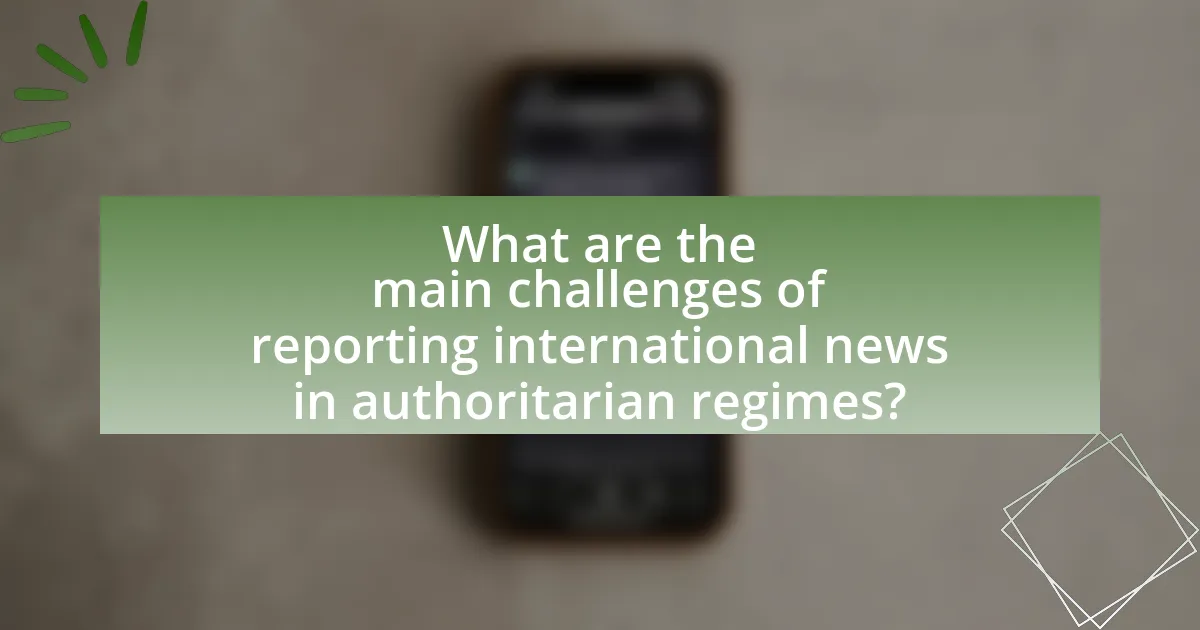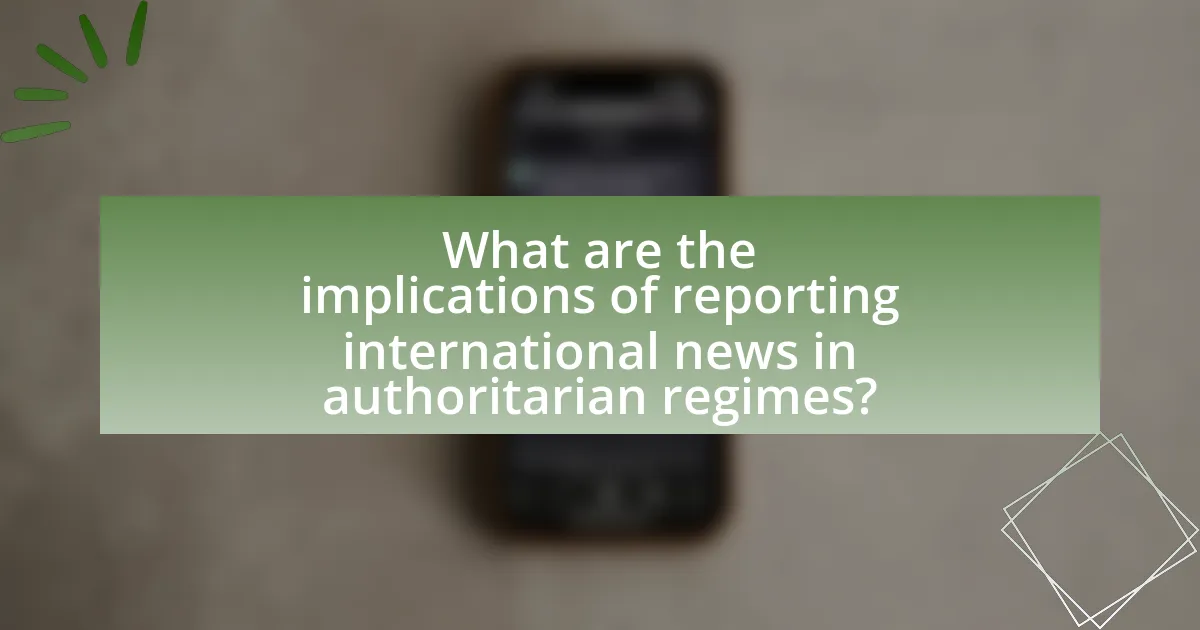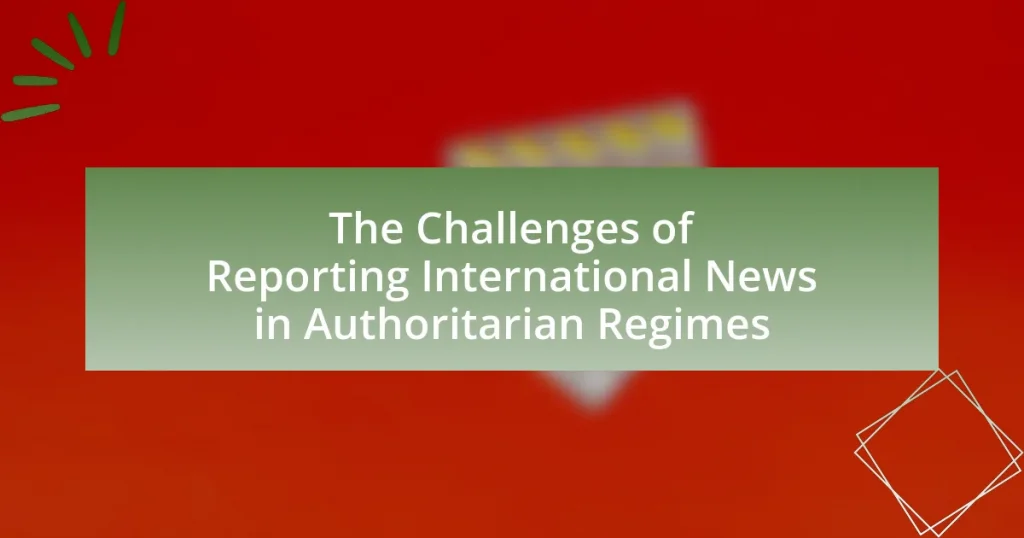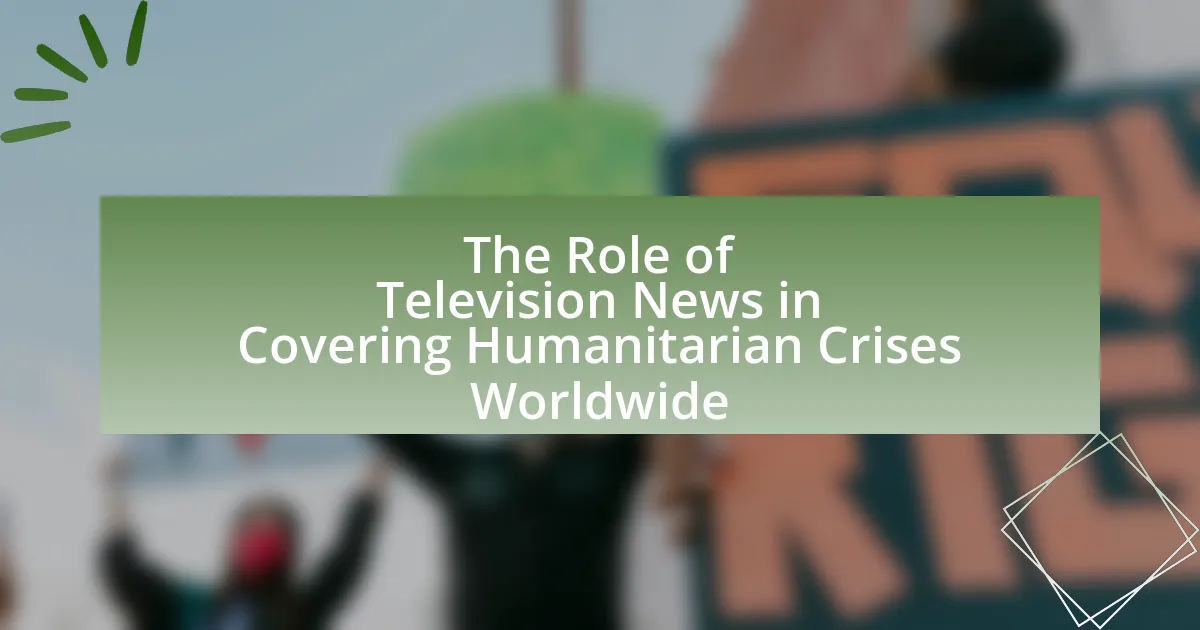The article examines the challenges of reporting international news in authoritarian regimes, highlighting issues such as censorship, government control over media, and the risks faced by journalists. It details how authoritarian governments manipulate information through censorship, propaganda, and surveillance, creating an environment hostile to independent journalism. The article also discusses the legal repercussions for dissenting views, the importance of reporting on these regimes for accountability, and the strategies journalists can employ to navigate these challenges while ensuring their safety. Additionally, it addresses the long-term implications for journalism in such contexts and emerging trends that reflect the resilience of reporters in oppressive environments.

What are the main challenges of reporting international news in authoritarian regimes?
The main challenges of reporting international news in authoritarian regimes include censorship, government control over media, and the risk of persecution for journalists. Censorship restricts access to information, making it difficult for reporters to verify facts and present accurate narratives. Government control over media outlets often leads to biased reporting that aligns with state propaganda, limiting the diversity of viewpoints available to the public. Additionally, journalists face threats of arrest, violence, or harassment, which can deter them from pursuing critical stories. For instance, according to the Committee to Protect Journalists, countries like North Korea and China exemplify these challenges, where strict regulations and severe penalties for dissent create an environment hostile to independent journalism.
How do authoritarian regimes control the flow of information?
Authoritarian regimes control the flow of information through censorship, propaganda, and surveillance. Censorship involves restricting access to independent media and the internet, often blocking websites and social media platforms that promote dissent. For example, countries like China employ the Great Firewall to limit citizens’ access to foreign news sources. Propaganda is utilized to disseminate state-approved narratives, shaping public perception and suppressing alternative viewpoints. In North Korea, the government controls all media outlets, ensuring that only state-sanctioned information is available. Surveillance technologies are also deployed to monitor citizens’ communications and activities, deterring dissent and maintaining control over the narrative. This combination of tactics effectively stifles free expression and manipulates public discourse in authoritarian contexts.
What methods do these regimes use to censor media?
Authoritarian regimes use various methods to censor media, including state control of broadcasting, internet filtering, and legal restrictions on journalism. State control allows governments to dictate content on national television and radio, ensuring that only approved narratives are disseminated. Internet filtering involves blocking access to foreign news websites and social media platforms, limiting the flow of information. Legal restrictions often include laws that criminalize dissent or impose heavy fines on journalists, creating a chilling effect that discourages independent reporting. For instance, countries like China and North Korea exemplify these practices, where the government maintains strict oversight over all media channels and employs advanced technology to monitor online activities.
How does state propaganda influence public perception?
State propaganda significantly influences public perception by shaping narratives that align with government interests and suppressing dissenting viewpoints. Authoritarian regimes often utilize state-controlled media to disseminate information that glorifies the state while discrediting opposition, thereby creating a biased worldview among the populace. For instance, during the 2014 annexation of Crimea, Russian state media portrayed the event as a reunification of historical lands, influencing public sentiment to support the government’s actions. This manipulation of information fosters a controlled environment where citizens are less likely to question the state’s motives or seek alternative perspectives, ultimately reinforcing the regime’s power and control over society.
What risks do journalists face in authoritarian environments?
Journalists in authoritarian environments face significant risks including censorship, imprisonment, violence, and harassment. Censorship restricts their ability to report freely, often leading to self-censorship due to fear of repercussions. Imprisonment is a common consequence for those who challenge state narratives; for instance, according to the Committee to Protect Journalists, over 250 journalists were imprisoned worldwide in 2021, with many cases occurring in authoritarian states. Violence against journalists can manifest as physical attacks or even assassination, as seen in the cases of high-profile journalists like Jamal Khashoggi. Additionally, harassment from state authorities can include intimidation tactics aimed at silencing dissenting voices. These risks create a perilous landscape for journalists striving to report the truth in such regimes.
How can journalists be targeted for their reporting?
Journalists can be targeted for their reporting through various means, including harassment, legal action, censorship, and physical violence. In authoritarian regimes, governments often employ tactics such as intimidation to suppress dissenting voices and control the narrative. For instance, according to the Committee to Protect Journalists, over 250 journalists were imprisoned worldwide in 2021, with many facing charges related to their reporting on government corruption or human rights abuses. This demonstrates the systematic targeting of journalists as a method to stifle free expression and maintain power.
What legal repercussions exist for reporting dissenting views?
Reporting dissenting views in authoritarian regimes can lead to severe legal repercussions, including imprisonment, fines, and censorship. For instance, journalists in countries like China and North Korea face harsh penalties for expressing views that contradict state narratives, often resulting in long prison sentences or forced labor. The 2021 report by the Committee to Protect Journalists highlighted that over 300 journalists were imprisoned worldwide, with a significant number in authoritarian states, underscoring the risks associated with dissenting reporting.
Why is it important to report on authoritarian regimes?
Reporting on authoritarian regimes is crucial for promoting accountability and transparency. Authoritarian governments often suppress dissent and manipulate information, leading to human rights abuses and violations of civil liberties. By documenting these actions, journalists can inform the international community, raise awareness, and potentially mobilize pressure for change. For instance, the reporting on the 2011 Arab Spring highlighted government repression, which led to global discussions on democracy and human rights. Furthermore, consistent reporting can provide a historical record that aids future generations in understanding the impacts of authoritarianism.
What role does international news play in promoting democracy?
International news plays a crucial role in promoting democracy by providing citizens with information about governance, human rights, and civic engagement in various countries. This information empowers individuals to compare their own political systems with those of democracies, fostering a desire for democratic reforms. For instance, studies have shown that exposure to international news correlates with increased public demand for accountability and transparency in government, as seen in the Arab Spring, where social media and international reporting highlighted democratic movements. Furthermore, international news can pressure authoritarian regimes by exposing human rights abuses, leading to international condemnation and potential sanctions, which can incentivize governments to adopt more democratic practices.
How can reporting on these regimes impact global awareness?
Reporting on authoritarian regimes can significantly enhance global awareness by exposing human rights abuses and government corruption. For instance, investigative journalism has revealed systemic oppression in countries like North Korea and Myanmar, prompting international condemnation and sanctions. Such reporting not only informs global audiences but also mobilizes humanitarian efforts and influences foreign policy decisions. The 2018 murder of journalist Jamal Khashoggi highlighted the dangers faced by reporters in authoritarian contexts and galvanized global discourse on press freedom, illustrating how impactful reporting can lead to increased scrutiny of oppressive governments.

What strategies can journalists employ to navigate these challenges?
Journalists can employ strategies such as building strong local networks, utilizing secure communication tools, and practicing ethical storytelling to navigate the challenges of reporting in authoritarian regimes. Strong local networks provide journalists with reliable sources and insights into the political landscape, enhancing the accuracy of their reporting. Secure communication tools, like encrypted messaging apps, protect journalists from surveillance and potential repercussions. Ethical storytelling ensures that journalists represent the voices of marginalized communities accurately, fostering trust and credibility. These strategies are essential for maintaining journalistic integrity and safety in oppressive environments.
How can journalists ensure their safety while reporting?
Journalists can ensure their safety while reporting by conducting thorough risk assessments and employing safety protocols tailored to the specific environment they are entering. This includes researching the political climate, understanding local laws, and identifying potential threats, such as hostile groups or government surveillance. For instance, the Committee to Protect Journalists emphasizes the importance of pre-reporting safety training and situational awareness, which can significantly reduce risks. Additionally, using secure communication tools and maintaining a low profile can help protect journalists from potential dangers in authoritarian regimes, where freedom of expression is often suppressed.
What precautions should journalists take before entering authoritarian countries?
Journalists should conduct thorough research on the political climate and legal restrictions of authoritarian countries before entering. This includes understanding the laws regarding press freedom, potential risks of detention, and the local government’s stance on foreign journalists. For instance, in countries like North Korea and Iran, journalists face severe penalties for reporting that contradicts state narratives. Additionally, journalists should establish secure communication methods and have contingency plans for emergencies, as demonstrated by the experiences of reporters in countries with oppressive regimes, where rapid evacuation may be necessary.
How can technology assist in protecting journalists’ identities?
Technology can assist in protecting journalists’ identities through the use of encryption, secure communication tools, and anonymity networks. Encryption software, such as Signal or PGP, ensures that communications remain confidential and inaccessible to unauthorized parties. Secure communication tools provide journalists with platforms that protect their messages from interception, while anonymity networks like Tor allow journalists to browse the internet without revealing their location or identity. These technologies are essential in authoritarian regimes where surveillance and repression are prevalent, as they help safeguard journalists from potential threats and reprisals.
What ethical considerations must journalists keep in mind?
Journalists must prioritize accuracy, fairness, and the protection of sources when reporting, especially in authoritarian regimes. Accuracy ensures that information is truthful and reliable, which is crucial in environments where misinformation can lead to severe consequences. Fairness involves presenting multiple perspectives and avoiding bias, which is essential for maintaining credibility and trust with the audience. Protecting sources is vital in authoritarian contexts, as revealing identities can endanger individuals and compromise their safety. These ethical considerations are supported by the Society of Professional Journalists’ Code of Ethics, which emphasizes the importance of these principles in maintaining journalistic integrity.
How do journalists balance truth and safety in their reporting?
Journalists balance truth and safety in their reporting by employing careful editorial judgment and risk assessment strategies. They prioritize the accuracy of information while considering the potential dangers to themselves and their sources, especially in authoritarian regimes where dissent can lead to severe repercussions. For instance, journalists often verify facts through multiple sources and may choose to anonymize sensitive information to protect individuals involved. According to the Committee to Protect Journalists, in 2021, over 300 journalists were imprisoned worldwide, highlighting the risks faced in such environments. This data underscores the necessity for journalists to navigate the delicate interplay between delivering truthful reporting and ensuring their safety and that of their sources.
What guidelines should journalists follow when reporting sensitive information?
Journalists should prioritize accuracy, context, and sensitivity when reporting sensitive information. They must verify facts through multiple reliable sources to ensure the information is correct, as inaccuracies can lead to misinformation and harm individuals involved. Additionally, journalists should consider the potential impact of their reporting on vulnerable populations, particularly in authoritarian regimes where repercussions can be severe. Ethical considerations, such as respecting privacy and avoiding sensationalism, are crucial. For instance, the Committee to Protect Journalists emphasizes the importance of protecting sources and being aware of the risks involved in reporting sensitive topics, especially in environments where freedom of expression is restricted.

What are the implications of reporting international news in authoritarian regimes?
Reporting international news in authoritarian regimes often leads to censorship, misinformation, and restricted access to information. Authoritarian governments typically control media narratives to maintain power, resulting in biased reporting that aligns with state interests. For instance, in countries like North Korea and China, foreign correspondents face severe limitations, including government surveillance and the threat of expulsion, which undermines journalistic integrity. Furthermore, the lack of independent media outlets means that citizens receive a distorted view of global events, impacting public perception and understanding. This manipulation of information can also lead to international diplomatic tensions, as foreign governments may react to the skewed narratives propagated by authoritarian regimes.
How does reporting affect the political landscape in authoritarian countries?
Reporting significantly influences the political landscape in authoritarian countries by shaping public perception and challenging state narratives. In these regimes, independent journalism often exposes government corruption, human rights abuses, and social injustices, which can mobilize public dissent and undermine the legitimacy of the ruling authority. For instance, the Arab Spring demonstrated how reporting and social media facilitated widespread protests against authoritarian regimes, leading to significant political upheaval in countries like Tunisia and Egypt. Furthermore, authoritarian governments frequently respond to critical reporting with censorship, intimidation, or violence against journalists, which can create a climate of fear that stifles dissent and limits the flow of information. This dynamic illustrates the critical role of reporting in both challenging and reinforcing the power structures within authoritarian contexts.
What changes can arise from increased international scrutiny?
Increased international scrutiny can lead to significant changes in authoritarian regimes, including policy reforms, enhanced transparency, and potential shifts in governance. For instance, when regimes face heightened global attention, they may implement reforms to improve their human rights records or economic policies to mitigate criticism and maintain legitimacy. Historical examples include the Arab Spring, where international focus prompted some governments to adopt reforms in response to public dissent and external pressure. Additionally, increased scrutiny can result in greater accountability, as regimes may feel compelled to address issues such as corruption and civil liberties to avoid international isolation or sanctions.
How can reporting influence public opinion within these regimes?
Reporting can significantly influence public opinion within authoritarian regimes by shaping narratives and providing alternative viewpoints. In these environments, state-controlled media often disseminate propaganda, but independent reporting can challenge these narratives, offering citizens a broader perspective on political, social, and economic issues. For instance, investigative journalism has exposed government corruption and human rights abuses, leading to public outcry and demands for accountability, as seen in the Arab Spring where media coverage played a crucial role in mobilizing protests against oppressive governments. This demonstrates that reporting can empower citizens, foster critical thinking, and ultimately shift public sentiment against authoritarian practices.
What are the long-term effects on journalism in authoritarian contexts?
The long-term effects on journalism in authoritarian contexts include the erosion of press freedom, increased self-censorship among journalists, and the proliferation of state-controlled narratives. Authoritarian regimes often implement strict regulations and censorship, which stifle independent journalism and limit access to information. For instance, according to the 2022 World Press Freedom Index by Reporters Without Borders, countries like North Korea and Eritrea rank at the bottom, reflecting severe restrictions on journalistic activities. This environment leads to journalists prioritizing safety over truth, resulting in a culture of self-censorship where critical reporting is avoided to evade government reprisals. Consequently, the public becomes increasingly reliant on state-sanctioned media, which undermines the diversity of viewpoints and critical discourse essential for a healthy democracy.
How does the suppression of free press impact future generations of journalists?
The suppression of free press severely limits the development and effectiveness of future generations of journalists. When free press is stifled, aspiring journalists are deprived of essential training, access to diverse viewpoints, and the ability to engage in investigative reporting, which are crucial for fostering critical thinking and ethical standards in journalism. Historical examples, such as the decline of press freedom in countries like Turkey and Venezuela, illustrate that young journalists often face censorship, intimidation, and a lack of resources, leading to a homogenized media landscape that fails to hold power accountable. Consequently, this environment not only discourages journalistic integrity but also perpetuates a cycle of misinformation and public distrust in media, ultimately undermining the role of journalism in democratic societies.
What trends are emerging in the field of journalism in authoritarian regimes?
Emerging trends in journalism within authoritarian regimes include increased reliance on digital platforms for news dissemination, the rise of citizen journalism, and the use of encryption tools to protect sources. Authoritarian governments are increasingly censoring traditional media, leading journalists to adopt online platforms where they can reach wider audiences despite risks. For instance, in countries like Belarus and Myanmar, citizen journalists have played crucial roles in reporting events that state-controlled media ignore. Additionally, the use of encryption and secure communication apps has become vital for journalists to safeguard their communications and sources from government surveillance, as seen in various reports from organizations like Reporters Without Borders. These trends reflect a shift towards more resilient and adaptive forms of journalism in the face of oppressive environments.
What best practices can journalists adopt when reporting in authoritarian regimes?
Journalists reporting in authoritarian regimes should prioritize safety, verify information rigorously, and utilize secure communication methods. Safety is paramount; journalists must assess risks and develop contingency plans to protect themselves and their sources. Verification of information is crucial due to the prevalence of misinformation; employing multiple sources and cross-referencing facts can enhance credibility. Secure communication methods, such as encrypted messaging apps, help protect sensitive conversations from government surveillance. These practices are essential for maintaining journalistic integrity and ensuring the safety of all involved.




